#Another reason for him to be my favorite character after Reinhard
Explore tagged Tumblr posts
Text
ACOTAR Future Families Headcanons
Ok I have few fun family headcanons for the acotar ships. (Disclaimer: I am not an fanfic author/writer so none of this will ever show up in a fanfic, I just like to create characters for headcanons, if anyone wants to use any of this for a story your more than welcome to do so just tag me so I can read it please 🙏😊😊😊🙏)
Feysand: they obviously have Nyx. I think they will definitely have 1 more and it will be a little girl. I also expect her name to be Stella (Star). (Personally I was expecting Nyx to be named Noctis and that their daughter would get the name Nyx since Nyx is actually the name of the Goddess of Night.)
Nessian: I am 100% committed to Cassian being a girl dad. My headcanon is that they have 4 girls. All with beautiful untouched wings. All who have embraced their Illyrian Valkyrie warrior training but also love fashion and formal events. I have this funny snippet that lives rent free in my head of Cassian proudly yelling at someone saying “My 10yr old daughter can kick your ass while wearing a tutu.” I think all their names will begin with the letter C: Cassandra(Cassie) Nesta surprised him with this name, Corine(Corie), Calista(Callie), Camille (Camie).
I do have this idea that Nesta and Cassian start their family journey off with them adopted an orphan/abandoned Illyrian baby girl that Cassian found and brought home to get her medical help and to just nurse back to health. Nesta sees him holding this crying baby trying to get her to eat from the bottle the healer gave him and she just melts for them both. And this baby is Cassandra.
Gwynriel: they had twins, boy girl twins. The girl was named after Gwyn Sister Catrin. And the boy’s name is Haden with his nickname being Hades (this is a guilty pleasure name for me, I have wanted to name a character this for years it even was a name on my boy baby name list). If though they want to stick closer to his name being similar to his sisters though, the boy version of Catrin is Cayson/Kasen/Cason (let me also add Kasen is my sons name so I am slightly bias in the boys names for this one).
Elucien: my favorite ship by the way. And yet I headcanon that they have 1 child, a son. I know crazy 😜. I have 2 reason for this 1) I like to think they like to keep their life simple. 2) I think they struggled to get pregnant. Their son is one of the youngest of the cousins, and he is highly cherished by his parents and family.
Their son’s name is Renard. Renard is French for Fox and Reinhard is German for Brave/Strong Council, which I think perfectly represents a child of Lucien and Elain. His nickname is Ren, I love it so much 🥰🥰🥰
He comes off as shy and definitely likes to clutch at his mother skirts when they first arrive at places. He is the quietest of ALL the cousins, lol (including Eris’ kids). But he’s observant and inquisitive and can be intrigued/curious. He likes to bake and garden with his mother, plays chess and work with his spell cleaving magic with his father and grandfather, go on hikes with his father and uncle where he learns about tracking and living off the land, he loves to read books, he loves to paint and draw, and he likes the piano. He literally is the little chameleon of the family, he see what interests other people and absorbs all their knowledge and collects it to try for himself. He’s been a little cautious around Uncle Cassian because Uncle Cassian was super excited to have another Nephew and tried to treat him like Nyx and Hades and that’s just not the kind of kid Ren is. Ren is closest to Nesta and Cassian’s youngest daughter Camille though. Camie is usually the bull in a China shop but with Ren she will slow down and let him show her what he is reading or drawing or teach her a new piece on the piano.
Eris: Eris is my other girl dad. He has 5 girls, which are nicknamed the Autumn Vixens when they get older. Him and Cassian are in a silent competition about who is the better girl dad, Eris beat Cassian recently by being able to do better girls hair styles. I am leaning towards their names being French inspired: Reine, Sophie & Sylvie (twins), Colette, and Elise.
Vassian: Vassa is an all boys mom. She has 6 boys and on her 7th pregnancy it’s finally girl.
#lucien vanserra#elain archeron#feyre archeron#rhysand acotar#nesta archeron#cassian acotar#gwyn berdara#azriel acotar#eris vanserra#queen vassa#jurian acotar#elucien#gwynriel#feysand#nessian#vassian#acotar headcanons#babies#ACOTAR families#kids
54 notes
·
View notes
Text
Binge-Watching: Legend of the Galactic Heroes, Episodes 67-69
In which the Alliance’s funeral march begins to play, and I’m impressed by how well Poplin is handled.
Twilight
Legend of the Galactic Heroes has never been a particularly upbeat show. It’s full of death, destruction, and deep cynicism about the capacity of government’s ability to do good. But even by those standards, these episodes feel particularly funerial. We are, after all, witnessing the dawn of the Alliance’s death, the once great bastion of democratic republicanism, now on the verge of being burned to the ground for good after betraying all its ideals and being swallowed by an authoritarian regime. Its morals are crushed, its stability is nonexistent, its leader is reduced to a gibbering coward who can’t bring himself to take responsibility for anything, and Reinhard’s sending the full might of the Imperial military to destroy what little scraps they have left. This is truly the end, and everyone seems to recognize it. Yes, Bewcock and the rest of the Alliance forces still have one more battle left to fight. But everyone- including the narration- is painfully aware that this will be the Alliance’s last stand as a military and democratic ideal alike. They even send out a bunch of their ships to join Yang’s third faction, a tacit acknowledgement that the future is truly in his hands. Whatever chance democracy still has lies with Yang now, and hopefully history will remember him for his ability to make peace as much as his ability to wage war. Until then, though, all the Alliance can do is make like a good captain and go down with their rapidly sinking ship in one last blaze of glory. Here’s hoping their final fight is one to remember.
Poplin Off
On a completely unrelated note, you know what’s really surprising me? The fact that I like Poplin so much. Usually, the sleazy womanizer/pervert archetype is my least favorite character whatever story they show up in and make me cringe out of my skin whenever they’re up to their usual shit (hello, Sanji from One Piece, Miroku from Inuyasha, Mineta from My Hero Academia...). So you think a guy like Poplin, who’s constantly chasing after the nearest attractive ladies, would be equally insufferable to me. But no, he’s actually entertaining! And I think it comes down to the fact that despite his high libido and latent chauvinism, Poplin actually is kind of a nice guy. He doesn’t force anything on his romantic pursuits, he genuinely tries to charm them, and he’s just self-deprecating enough that he doesn’t come off like a complete tool (”I’ll leave the women with good character to you, Attenborough. I’ll take the naughty half.”) He’s a bit of a sleazeball, but he’s not a scumbag, and that makes it far more entertaining to watch him mosey his way through one ill-advised charm offensive after another (”I didn’t think the husband would come back!”) He’s honestly kind of a textbook example of how to do this character right. So kudos for that, LOTGH. I never thought I’d be praising you for this of all things, but by now I should expect the unexpected.
Odds and Ends
-”You must not get much sleep if you think about these small things, Fraulein.” Hey, she’s perceptive. It wouldn’t do for your name to become a cheap excuse for selfish people to justify their selfishness.
-Jesus, dude. You’re lucky you’re talking to someone as reasonable as Mittermeyer, otherwise you’d be shot dead.
-Aaaaah crap, what’s Rubinsky trying to pull now?
-Damn, that was a cool shot of the asteroid base blowing up.
-”I’m Yang Wen-li. It’s good to be here.” he’s so bad at politics akjhaskjdhas
-”A commander without soldiers is like a star without planets. Just shining pointlessly in the dark.” I like this line.
-Uuuugh come on dude don’t let revenge drive you into the ditch
-Wait, Julian’s back at El Facil already? What was the point of going to the Imperial capital, then? Lame.
-”I’m back where I belong.” Aaaaaaw.
-Oh boy, what’s with this ominous narration about the floppy disk?
-Ick. She’s not gonna appreciate that, Schonkopf
Looks like shit’s really gonna go down next time. See you then!
6 notes
·
View notes
Text
First time read through light novel vol. 8. Random thoughts.

...So...does anyone else feel a little uncomfortable with that cover image between Reinhard and Felt? I mean, I know he's not going to do anything sexual to her and she's not as young as I originally thought she was (I think vol. 1 said she was 15, while ever since the anime I thought she was like 10 or something), but she still is underage, being forced into wearing and doing something she doesn't want to by a grown man, and I think just the way he's got his hand holding her bare thigh makes it feel more sexual than it should be.
Also, is Wilhelm floating? The heck is he sitting on?
Subaru was afraid of death. Dying constantly trashed his life with an unbearable sense of fear and loss. He thought it was like that for everyone; he assumed that was how it had to be. Subaru, who had experienced death more than anyone via Return by Death, didn’t want anyone else to know what it was like.
I'm definitely seeing more similarities between Subaru and Ferris here than I did in the anime. I like how they both have a more unique perspective on life and death than most people would; Subaru from his Return By Death and Ferris from being such a powerful healer (to the point he can even regenerate himself from near death, I guess). Again, for a series where death can be undone so easily, it really knows how to use that premise to show just how weighty and serious death is. While the two will and do kill, it sits with them more than it does for others because they know just how awful death can be.
Something I've really enjoyed when reading through various LN series after watching the anime first is that I end up liking certain characters that I didn't in the anime. I didn't hate Ferris but the cutesy way he talked really bugged me and I didn't focus on him much. Here though I'm definitely getting a better feel for his character, especially with how much he values life, cursing at the suicidal witch cult members for tossing theirs away so easily. He and Subaru's back and forth makes the ending feel that much more heartbreaking when Ferris has to mercy kill the possessed Subaru.
Also, just to clear up any confusion I have, is Ferris in drag or does he identify as a woman? I don't have any problem referring to him from now on as a "she" (I never had that problem with Magne in My Hero Academia) but I'd prefer to get my facts straight. Ferris also makes a joke about Subaru swinging over to his side of the fence but I'm not sure if that means he's gay or not. It's a little hard to tell how far his affection for Crusch runs, for example.
Similarly, there's Julius, a character I never disliked in the anime, but I can definitely see more of a path to him and Subaru becoming friends here. It is funny that a comment from Ferris got me thinking how something to two have in common is how easy it is for them to get others to immediately dislike them just by talking. For Subaru it's because he too often talks without thinking, shoving his foot into his mouth, and for Julius it's how unintentionally snobbish and "better-than-you" he can sound. It's also nice that the story is getting Subaru to try and work through his issues, acknowledging that he's being unfair towards Julius, whom really has done nothing wrong aside from unintentionally pricking at Subaru's inferiority complex.
Like Subaru, I thought demon beasts and monsters were just so common in the world that a barrier around a lord's domain was a very common thing. But from how the other characters in-story are talking, it sounds like Roswaal deliberately put his domain and the village in the center of (or at least nearby) a demon beast habitat. Even in the anime I always believed he knew more than he let on but here he feels like a straight-up mastermind with everything he's been pulling behind the scenes and all the things he's done that, as of yet, have no explanation or reason behind them. Just what is he up to?
One thing I'll say about this series in comparison to some others I've seen/read; the dark magic here, like with the Witch of Envy, Return By Death, the White Whale, and the Unseen Hands, really feels like DARK magic. I've seen series that have their own version of dark magic that'll make bad things happen or summon demons or sacrifice people, but this? Everything to do with the witch feels creepy and unnatural, like it's not or should not be part of the world. With how much suffering it's caused, the mystery behind the gospel, just how unhinged Petelgeuse is and his body jumping, it all feels like stuff you should really not be messing with. Even at the end with Subaru running off and Julius finding him, getting no response at first from Subaru, feels like something out of a horror movie.
Subaru keeps getting asked if he's Pride, to which I'm assuming they mean if he's the one to become the Archbishop of Pride. Personally, my theory is that because of how much the witch seems to "favor" him, Subaru is Envy, like, well, the Witch of Envy and the only one of the seven sins they never mention to have an archbishop, given Satella destroyed the other witches. If that's the case, I can only imagine how much that's going to piss off all the other archbishops, that after all their shows of devotion some schmuck came to their world out of nowhere and became Satella's favorite.
“Lending one’s strength does not mean merely swinging one’s sword. It means challenging the same foes, worrying over the same obstacles, sharing the wounds and the weight of the burdens. This we can do. This is the lesson I learned in the past.”
Obviously this is meant primarily for Subaru but I can't help but think it can apply to Rem and Emilia as well. With the exception of Puck, Emilia tends to go out of her way to avoid involving others in her problems or having them feel they owe her anything when she helps with theirs. Rem dedicated a good chunk of her life to live as her sister's replacement after Ram lost her horn and tried to kill all the demon dogs on her own after Subaru was cursed saving her. They both seem determined to bear the weight of their burdens solely on their own, like they're the only ones who need to suffer. Subaru goes back and forth on how much he involves others in his problems, but while he's more than willing to help ease the burdens on others, his problem for the longest time was that he was so fixated on "swinging his sword", as he thought fighting and strength was the only way to help (probably because strength would honestly solve a decent chunk of his own problems).
“Two days ago, the forest around the mansion became unnaturally calm... to the point that even my eyes could catch nothing. Thereupon, an armed group appeared bearing the crest of the House of Karsten, which had declared war with the blank letter... Surely you cannot blame my little bird’s heart for being on the verge of breaking?”
Ram, I had no idea how much I missed you until you came back.
Namely, that someone out there had swapped his letter of goodwill, aiming to turn Emilia and Crusch against each other.
I don't think a line or speculation like this was in the anime, which it probably should have been. Without it, it just seems like Subaru's an idiot and made a stupid mistake, but now it seems like someone is directly manipulating events behind the scenes. Personally, I'd say my money's on Roswaal if I didn't have terrible luck when it comes to gambling.
“Silence! Cease your prattle! Give that book back, right—”
“Hey, don’t shout. If you get too angry, you know—your brain’ll shake.”
...
“G...gah...! How dare you, dare you, dare youuuu! My disciple of love!!”
“Don’t gimme that, you’re the one who mixed us up! Tunnel vision! What, are you lazy?!”
HA!
Overlord was the first light novel series I read (the only other LN I'd read before was Death Note: Another Note - The Los Angeles BB Murder Cases and that was years ago), so naturally it's the series I tend to make the most comparisons to for the other series I've been reading. In this case, something I really like about both Ainz and Subaru is that, despite how they're presented sometimes, neither is actually stupid (though they too often suck at reading the room). They're both just in situations way over their head and they have no frame of reference for how to deal with these fantasy world situations. Subaru, like with tricking Sloth into getting attacked by demon beast or figuring out what was up with the flowers, has plenty of times where he shows he can come up with decent plans or quick thinking that can pull off a win. His flaws are based more in his own immaturity and need to grow more as a person.
Honestly, Ainz and Subaru are fun to compare because, of the LN MCs I've read so far, they both seem to get every break the other doesn't. Ainz is obvious. He's got actual power, tons of resources, and numerous people whose faith in him is absolute, while Subaru has almost nothing save for the curse and the clothes on his back and has to continuously struggle to make any difference. On the other hand, Ainz has no one in his life he can relate to or be his real self around, making him feel incredibly empty and lonely, while Subaru has attracted a surprisingly wide web of people around him whom, despite some hiccups, do genuinely believe in the real him.
I am 90% certain Emilia and Puck fighting Sloth wasn't in the anime. Well, no wonder anime-only fans have trouble liking her when you cut out nearly all of the character's best sh*t! [Edit: I was wrong. Another post pointed out it was at the end of ep 23. Like I said, it's been a bit since I saw the anime and I remembered none of this fight. Though I still stand by that LN Emilia is better than anime Emilia] Like I've said before, it's not like anime Emilia could just be replaced with a sexy lamp and nothing would be different, but compared to the LN version she really didn't get a lot to do in the anime outside of the first arc. She wants to be queen and sometimes heals people. Otherwise she was mostly off-screen or serving as Subaru's object of affection (and sometimes obsession). Just being able to fight isn't everything but Emilia here certainly feels like she has a lot more fire to her personality and does more when she appears. She's not just a nice, pretty girl for the MC to fight for.
Somehow, he’d died again. He’d probably lost it all once more.
He surrendered everything to the abyss. This was the familiar embrace of failure after he pathetically lost his life.
Look back at the world.
Look back at your failures.
Don’t forget. Don’t forget. Do not forget.
Ferris’s tear-filled voice. Wilhelm’s lament, shaking with regrets. Julius’s resolve and remorse, so great he probably gnashes his teeth over it—Don’t forget, ever. No matter how low you are, don’t ever let go.
Is this Satella saying this to Subaru? I'd assume so since it ends with the "I love you" line Subaru's been getting before he RBDs. But if so, why is she saying this to him? One theory is that she has her own regrets from her life and is giving Subaru a chance not to have the same. That assumes she is a good person and that the stories around her are wrong. Another theory, given the Witch of Envy title, is that she's insisting Subaru never let go of what's his. It's his (and hers, since he is hers) and no one else can have it. I mean, that applies more to greed than envy, I suppose, but stretching a bit you could say she'd be jealous of a world moving on without her.
Original Reddit post: https://www.reddit.com/r/Re_Zero/comments/gwjfwy/novels_first_time_read_through_light_novel_vol_8/
2 notes
·
View notes
Note
ooh ooh. can you dvd commentary "the wine we fought for" from "Are you a masochist, Schonkopf?" to "Schonkopf felt a fleeting moment of pity for that one other person, whose life and honor the firebombing must have saved"?
MY PLEASURE, THANKS. sorry this is super long because you picked a fresh ‘un.
“Are you a masochist, Schonkopf?” he said.
“Who, me?”
I obviously love Yang and Schonkopf’s stupid conversations in-show for a lot of reasons, but one is that Yang is a little less sure of his footing around Schonkopf than e.g. academy friends (and has reason to be!), so he puts more effort into actively turning the tables when he’s uncomfortable. He also spends less time playing dumb, I think because he finds Schonkopf’s incitement-to-revolt genuinely worrying and doesn’t want to give it any quarter—Schonkopf seems willing to take anything less than a flat denial as encouragement, so this makes some sense. Actually, Schonkopf might take encouragement from a flat denial, which is presumably why Yang always hears him out first, to make a point out of “it’s not that I don’t trust you enough to share my secret ambitions, it’s that I trust you and I DON’T HAVE SECRET AMBITIONS.” I also like that Yang’s efforts to wrongfoot him often work, at least a little, although he’s a recovery artist. But his recoveries involve digging himself deeper in/showing more of his hand, as far as personal investment is concerned.
“Well, take this. I can’t imagine you’d enjoy seeing me paired off. It would offend your sense of justice—and rightly so. How can a man like me go courting?” With his free hand he drew a line across his neck. For the guillotine? “As for your other demands… If I seized control of the government, your life would become very boring. Subduing the populace, night raids—for a man of your talents, it’s a snore. We’d never go to war again. And yet you go on asking me to take up the mantle of power.”
I do think Yang kind of equates “Schonkopf urging dictatorship upon me” and “Schonkopf meddling in my love life.” Which is interesting, because… in some ways the show wants to set up the desire for a happy private life and the pressure to seize power (and protect himself) as opposing drives in Yang’s life, but obviously for Yang himself they both represent an unconscionable turn toward self-interest—toward self-interest and away from his obligation to, uh, all the people he’s blown up. I don’t know that Vermilion is really about Overcoming The Guilt so much as it is discovering a little humility; in targeting Reinhard and proposing to Frederica he’s slightly overriding the control freak instinct that says “you hold the ultimate power here and will fuck everything up personally.” But it’s charming to me when people are like “??? why doesn’t Yang ignore the order for the sake of the greater good,” when it’s made pretty explicit that if Yang were following his idea of a straight consequentialist agenda, he wouldn’t fight Reinhard at all…….. Well, and there’s more to it than that, because part of Yang’s brand of consequentialism is trying to force himself out of the headspace that believes perfectly informed decisions can ever be made by fumbling individuals. Still.
That said, I feel “your job would suck under the Yang Regime” is a pretty compelling argument and one Schonkopf should lend further consideration
“You’ve confused me with yourself,” Schonkopf said, after a pause. “A man so afraid of being bored, he closes his eyes to everything that might disappoint him.”
Yang blinked. But Schonkopf had warmed to his subject. “Now, me—though it might involve some personal sacrifice, I would find matters to interest me in your dictatorship. And if you were in love… ‘Yang Wen-li, laid low by passion!’ I admit, you’re not a natural. Is there any part you’re a natural for? But as we’ve discussed—you’re not a bad student.”
The most unrealistic part of this fic is the idea that this would in any way strike Yang as an odd or unprofessional thing for Schonkopf to say. But as I discovered while editing this scene, there’s actually no line weird enough that it DOES make sense as a trigger for Yang’s realization. I made the sort of boring decision while writing that… characterization-wise I am okay with Yang moving things along here, on the basis that Yang is interested in letting off some steam and has entered into that kind of self-soothing mindset he’ll increasingly show on the road to Vermilion. And I think if Yang were going to choose any time to hit on Schonkopf, or better yet blindside Schonkopf by arbitrarily declaring Schonkopf to have hit on him, it would certainly be as part of a high-level deflection away from one (1) question he doesn’t want to answer about Frederica and/or himself as a person who experiences positive desire. In this case actually it wasn’t a question, it was just Schonkopf suggesting he reach out to a grieving friend. Yang: What? No!!
Yang is also kind of the Aslan of LOGH in that whenever a person comes to him about a third party’s possible crush on him, he’s like, “no, I’m going to tell you about your crush now. no one is told any incriminating details but their own.”
He leaned forward; and for once, Yang didn’t shrink away. Emboldened, Schonkopf wiggled his fingers in Yang’s face, invoking the spirit of a fairy godmother over a pumpkin. Yang moved his head to one side and squinted. “Are you making a pass at me?”
With the body language I did want to convey that Schonkopf has overshot his normal careful boundary-testing, partly because he’s feeling “vulnerable” about the one-sidedness of his investment—that’s part of what him ordering the autopsy under his own authority and then feeling weird about it is supposed to set up, though I don’t know if it works.
It was natural to lower his hand. It was natural to smile pedantically, as if letting himself in on the joke.
I’m happy with this line because for me it immediately evokes OVA Schonkopf’s whole face situation.
“I can’t say I’d thought of it. But for you, Admiral, I would make an exception…”
One question that it might be reasonable to address, now that I’ve gotten into it about all these… characterization considerations, for a very short and unimpassioned relationship upgrade scene… is why I didn’t just have Schonkopf initiate. And the answer is, because Schonkopf is a cowardly opportunist! Of sorts. I mean, he’s not Yang-level, but we see with Katerose how unwilling he is to go out of his way to do anything that might involve inconvenience for him, and I don’t think he’s so attracted to Yang he’d consider it worth the risk. Maybe. I mean, in general he’s not the sort of person who “risks” things for sex. It depends how you picture both FPA culture and the culture within the military, but I think especially in the first half of the show Schonkopf doesn’t seem confident enough about where to place Yang in any of that, even just as an “unsoldierly” person with all these performative civilian aspirations, that he’d put himself out there without some sign of interest from Yang. I think also with both Yang and Frederica he has this pre-emptive sour grapes thing of like, I don’t have a chance so I’m going to sublimate all my energy into weird interrogations of their joint ward, which Julian calls him out on in the one target practice scene, lol.
“No, really.” Schonkopf eased his weight off the desk and raised an eyebrow, a half a beat too late. Yang was practically glowing. His eyes had popped open. Disgusted, Schonkopf understood that he was ignoring any implications: he had the silly, brazen look he got when alone with an ideal puzzle. “I thought you were sour Frederica turned you down,” Yang stage-whispered, putting his hand flat on the desk in a covert slap of triumph. “I was too narrowminded. General, if you have a complaint—”
Yang is so dumb lol. None of the above commentary is meant to imply that this isn’t a genuine lightbulb moment for him, at least on a conscious level. Yang: “huh, this hot guy is constantly up in my business, I guess I can leverage his curiosity as loyalty” —> “ohhhhh he cares about me as a PERSON i can use him for SEX”
He paused. I should have timed it, Schonkopf thought, and folded his arms.
“How curious,” said Yang, leaning back. “I seem to have lost my head. I apologize if I said something in bad taste. It was a joke. Uh, a test?”
I wrote a less halfassed version of this and then had to ask myself whether Yang would put any effort whatsoever into offering someone ELSE a graceful exit.
Schonkopf shook his head. His arms stayed crossed. Yang stared up at him, and stifled a yawn. When the silence had gone on another moment, he appeared to sag. “This is difficult. Usually, the other person makes a move, and we’re interrupted by a firebombing,” he offered. “Well, I say usually. It’s only happened the once…”
“How would you know?” Schonkopf said, kissing him.
He felt Yang tense. The change was harsh. But, equally quickly, he relaxed, and even moved with the kiss. His hands settled on Schonkopf’s shoulders. Schonkopf felt a fleeting moment of pity for that one other person, whose life and honor the firebombing must have saved.
Anyway, my favorite thing about writing this scene was just that Schonkopf doesn’t know who Jessica Edwards is. Could Yang pull this line on Frederica? He could not! But Schonkopf, while a stalker, isn’t one of those weird stalkers who knows your dead friends’ names. Here, that puts him at a disadvantage.
“life and honor” — I like this bit because, although it’s just a joke, I enjoyed making Schonkopf be wrong in this fic, in general, as a dramatic irony thing but also because I like when characters are wryly, ruefully, or resignedly wrong. Like, they put some thought into this! Still wrong. And often the way in which they are wrong shows a real lack of imagination about how many different things can fail terribly—sure, getting emotionally involved with Yang is a bad idea and about to become a much worse one, but disengaging didn’t save Jessica. Yang is not the be-all and end-all of horrors awaiting anyone in LOGH universe, and it’s important that Schonkopf can’t see beyond that for even a second.
5 notes
·
View notes
Text
Commentary regarding Icebergs (1 to 4)
· Ice: The Free Planets Alliance idiotically splits their 40,000 ships into three fleets far apart from each other
· C’mon, it was a nice idea, the execution was the problem here. That, and the commanders’ pride
· -
· Ice: Meanwhile, Reinhard and Kircheis make moon-eyes at each other
· We all have to admit that, when we start this, there’s a lot gazing into each other’s eyes that makes you a bit suspicious
· -
· Ice: Reuental and Mittermeyer go on a date
· YOU GUYS KNOW I ACTUALLY SUSPECTED THEM OF BEING A COUPLE
· -
· Ice: Kircheis gently nudging Reinhard to be a bit more empathetic than comes naturally to him.
· I agree with this
· -
· Ice: Annerose is a tragic figure, and on the surface she’s characterized as a pretty one-dimensional martyr-type, which can be frustrating and confusing in a show where even the most minor character contains multitudes. But Annerose does contain multitudes—they’re just hidden under a series of facades, erected by a woman who has been subjected to a decade of sexual slavery
· I hate to say it, but this is true
· Still don’t like her though
· -
· Ice: and by a creative team that was trying, in 1988, to tell a story about two boys falling in love.
· Ok, I wasn’t expecting them to jump right into it, but let’s go
· Maybe they’ll convince me
· -
· Ice: She is beautiful, docile, and a victim, the quintessential damsel in perpetual distress. She feels like a symbol, in a world richly populated by humans; her identity is presented to us as revolving entirely around men. There’s no way around it: As our first named female character, Annerose is irritating as hell
· I ain’t gonna disagree with this
· -
· Ice: the fact that in the LoGH novels and short stories, Annerose is heavily implied to be Kircheis’s love interest, whereas in the anime, Kircheis’s love interest is Reinhard. There are a few ways we know for sure that this was an intentional divergence, which we’ll definitely bring up when we get to them
· I’m curious, cus the show did sell me the whole romantic subplot between Sieg and Anne
· -
· Ice: Yang takes command of the remaining fleet after his commander is injured, and promptly outsmarts Reinhard when Reinhard tries to split his fleet down the middle by…splitting the fleet down the middle himself. This forces the battle to become a clear metaphor for the endless futility of this 150-year-war
· THAT’S VERY TRUE, NICE
· -
· Ice: Yang’s history and relationship with Jessica will get fleshed out more in the future
· Guys
· No, guys
· Jessica was awesome
· She was an amazing female character
· I’m still very sad that she had to die so soon
· And without accomplishing much (or having much airtime)
· -
· Ice: But also 2) train yourself now to peel away any heteronormativity that’s coloring your assumptions about what the show wants you to think.
· Ice, I think you’re starting to push it…
· -
· Ice: Who is this mysterious and beautiful baroness attempting the sisyphean task of cheering up Annerose? Why, it’s Magdalena von Westfalen
· I LIKED HER AND THEN SHE DISAPPEARED FROM THE PLOT, WHAT HAPPENED
· -
· Ice: Magdalena takes absolutely no shit from anyone, and I (Elizabeth) would die for her.
· Same
· -
· Ice: Who the fuck is this person? Yang has a “ward”? Why? IS YANG BATMAN?? These are all good questions to be asking yourself.
· Yang trying to be Batman would be hilarious
· Cus I just see him complaining every step of the way
· -
· Ice: Character development in small visual details: Julian styling his collar and sleeves to exactly match Yang here shows his hero worship and desire to emulate him.
· OOOOOOOOOOOOOOOOOOOOOOOOOOOOOOOOOOOOOOOOOOOOOOOOOOHHHHHHHHHHHHHHHHHHHHHHHHHHHHHHHHHHHHHHHHHHHHHHH
· -
· Ice: White men: eating this nationalist crap up. White women: feeling slightly uncomfortable but not saying anything. POC: so over Trunicht’s bullshit that they literally all faked sick to avoid him.
· Ok, no, I’m loving this
· -
· Ice: By now I’m sure you’ve noticed that the power structures in LoGH are incredibly male-dominated. (…) Hell, LoGH doesn’t indisputably pass the Bechdel test until episode 103 out of 110.
· Story of my life…
· -
· Ice: The handful of female characters that we do get to know exist within this society as fully defined individuals
· Ok, this I don’t completely agree with
· The author tries to give some sort of dimension to the female characters he creates, but they all end up… limited. And not in the way that represents “Oh, society doesn’t let women do what they want”, but simply in the way that women… are still women. And this is extremely hard for me to explain.
· I’m conscious that all the women in the show are women. And you probably are going “Yeah, and what’s the problem with that?” but that’s the thing. Like being blond or black or needing to wear glasses, it should just be a characteristic and not something that defines them (even if society then stereotypes you and forces you into going through certain events that become common for said characteristic – however, said experience is always personal). A female character in LoGH is female first and then something else.
· That isn’t to say that what the author did with his female cast isn’t great, because it is. He cared enough to portray their struggles, even if he didn’t identify with them (and because of it, they feel somewhat generic), and I’m pretty sure that the years the novels and the animated show came out in weren’t as kind to female characters as he was. However, by our current standards, it’s very lacking.
· I’m not sure I managed to express myself well, but I’m moving on.
· -
· Ice: Meanwhile Julian, a 14-year-old boy, happily and enthusiastically keeps house for Yang, cooking and cleaning and making tea. While many of the female characters overtly break with the traditional roles assigned to women (by entering politics, the military, etc.), Julian is one of the only characters to push in the other direction; and it’s important that (spoiler) the show never plays this for laughs or really remarks on it at all
· Huh, this is true
· Very true
· And I never realized that
· Nice one, show!
· -
· Ice: And again we see his passivity as he lets the silence stretch until she finally walks away.
· Kinda of one of the reason why Yang sometimes pissed me off
· -
· Ice: Kircheis is rudely accosted by the sinister Oberstein.
· Not a fan of Oberstein, I see
· Well, I was informed of it, so I was expecting it
· -
· Ice: Oberstein absolutely uses his malfunctioning robot eyes to intimidate people and then pretends he was unaware.
· I like this idea, but at the same time I really think he’s just like thatTM
· -
· Ice: But first, Oberstein. We’ve seen glimpses of him in the background before now, but it’s finally (deep sigh) time to meet everyone’s least favorite character. You probably don’t hate him yet, but you will. Oh, you will!
· HA!
· -
· Ice: Kircheis, a very smart boy, hates Oberstein pretty much the second they meet.
· I actually disagree
· I think Sieg was wary of Oberstein
· But to be honest, I never thought Sieg hated him
· In fact, I think Sieg would one of the few that would almost like Oberstein
· -
· Ice: we’ll have plenty of time to hate Oberstein later on
· COME AT ME
· -
· Ice: Almost as soon as Reinhard (jumping out of the car like a little kid, bless his heart)
· God bless his heart, indeed
· -
· Ice: Reinhard seems to interpret his father’s meaning to be that Annerose consented, or at least assented. Horrified, he sprints upstairs and demands to know why she would do such a thing. Her answer, adding yet another layer of Fucked to this already Extremely Fucked situation, is basically, “I’m doing it for you.”
· Ice: No pressure, Reinhard!
· *aggressively points to this*
· -
· Ice: Kircheis, with no direct way to help, does the only thing he can: He follows Reinhard on a dangerous, er, mission in the hope that he can maybe keep things from escalating too much. Which… is pretty much Kircheis’s job in life, to be fair.
· God bless that boy, he tries so much
· -
· Ice: Reinhard has never, not once in his life, chilled.
· THAT’S WHY WE LOVE HIM
· -
· Ice: This is a huge turning point for Reinhard, who finally has somewhere to aim his ambition: He’s going to do whatever it takes to get Annerose back, and if that means rearranging the entire universe to suit his needs, that’s what he’ll do.
· Like the way Ice expresses this. Rein has an enormous amount of ambition, but said ambition had yet to take a shape. This sentence implies that Rein could have used it in other areas, but it was this event with his sister that ultimately guided him unto a specific path. I like that idea a lot.
· -
· Ice: Kircheis isn’t going with Reinhard because Annerose wants him to; he isn’t even going with Reinhard because Reinhard wants him to: Kircheis is going with Reinhard because he wants to.
· THIS
· -
· Ice: I assume Reinhard looks so relieved here because he somehow managed to walk successfully down a flight of stairs backwards.
· I THOUGHT THE SAME THING
· -
· So far, I’m enjoying Icebergs
· I think the homosexual subtext they’re trying to read into is kinda forced, but nothing too grating so far
· -
5 notes
·
View notes
Text
Episode 26: Farewell, Distant Days
Dear Icebergs readers—as we’ve reached the first season finale of LoGH, we’ve inevitably arrived at some pretty serious spoilers, so if you haven’t already seen all of LoGH season one, I would advise against reading any further. Instead, you can find our FAQs here and our very first post here, and we hope to see you back here soon!
Everyone else: When you're ready, please proceed to our episode 26 post, below. —the editors

September-October 797/488. Ansbach’s assassination attempt on Reinhard is thwarted by Kircheis—first by knocking his gun out of the way, and then by taking fire himself from yet another concealed weapon, this time in Ansbach’s ring. Ansbach shoots through Kircheis’s chest and neck, then bites a poison pill to commit suicide. Reinhard’s admirals scramble, but it’s too late to save Kircheis, who dies while Reinhard holds his hand and looks on in bewilderment. Beyond devastated, Reinhard shuts himself away with Kircheis’s body for days on end. Oberstein convinces the admirals to cast former ally Lichtenlade as a scapegoat for Ansbach’s crime, and, grateful for something to do, the entire fleet storms Odin. Meanwhile, Oberstein informs Annerose of Kircheis’s death, Reuental receives an unexpected invitation, and Reinhard hardens his heart.
Reinhard and Kircheis
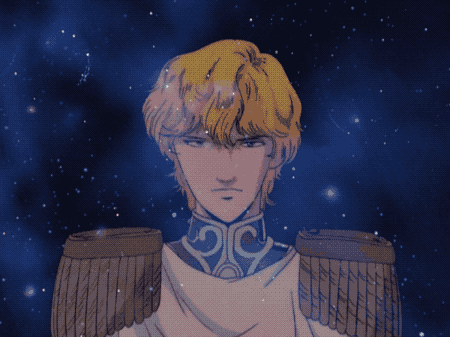
The first time I watched episode 26 of Legend of Galactic Heroes, there was a moment when, literally sitting on the edge of my seat, I wondered if this show was about to disappoint me horribly. Kircheis was, clearly, dying. The admirals were fluttering around him trying and failing to stop the bleeding, giving up on leaving to go get a doctor—too quickly, it seemed. And where was Reinhard? Why wasn’t he there?
As a queer consumer of media, I’m used to this kind of disappointment. Seeing my experiences reflected onscreen at all remains rare, and when a piece of media does deign to include a queer character or two, more often than not they’re killed off unceremoniously in as homophobically moralizing a way as possible. The death scenes of queer characters tend to leave me with a sick feeling not because I’m grieving the character but because I hate that I’ve had to give up on expecting queer characters and their relationships to be given a fraction of the respect afforded their straight counterparts.
The first 25 episodes of LoGH had surprised me with their nuanced and respectful depiction of queerness, in particular of Reinhard and Kircheis’s relationship. But as a seasoned veteran of queer media consumption, as Kircheis bled out on the floor while Reinhard did who knows what across the room, I didn’t know how else to interpret what I was seeing other than “Kircheis is about to die alone.” My stomach hurt. And then, this happened:

Given that it’s animated, LoGH has so far been remarkable in its commitment to realism. Without exception, what has been shown to us onscreen has been presented as an accurate depiction of events; the closest to a diversion from that has been the show’s frequent use of flashbacks, but even those are always anchored to a specific character’s experience of remembering the past.
As Reinhard steps painstakingly down the stairs toward where Kircheis lays in a pool of his own blood, the creators of LoGH throw away their own established set of rules. What we are seeing is no longer what is literally happening; instead, we are with Reinhard—and for him, nothing in the world exists at that moment except Kircheis and himself. With this scene, the LoGH creative team show us that they will do whatever they have to in order to respect their characters: If there are too many people around for Reinhard and Kircheis to get the intimate last goodbyes they and their relationship deserve, well, everyone else will simply have to be removed.

Even the lack of voiceover accompanying Reinhard’s quick series of flashbacks here reinforces the extent to which reality has been skewed for the duration of this scene.
For me, this was when LoGH went from being a great show to being (as you may have noticed) my favorite show—and not just because of how kindly it treats its characters, even while they experience gut-wrenching tragedy. Kircheis’s death changes Reinhard and, as I’ll obviously be exploring at length as we move into season 2, that changes the entire landscape of the show. Though from the beginning it has always been deeply personal and human, especially for a war epic of such massive scale, the question of what Reinhard will do now, without Kircheis, turns LoGH psychologically dark in ways that have only been hinted at so far.
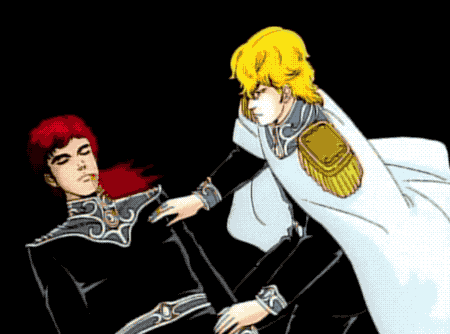
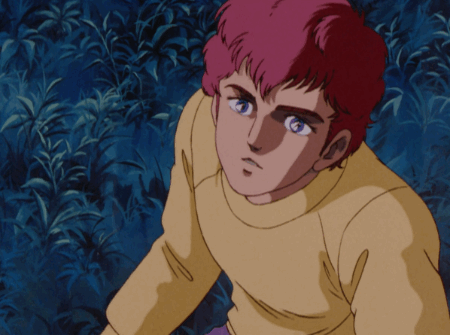
Back in episode 4, we were first introduced to Reinhard’s plan to gain enough power to rescue Annerose from the clutches of Kaiser Friedrich IV. Friedrich IV has since died of natural causes, freeing Annerose without Reinhard’s help. In episode 8, we learn that Reinhard’s ambitions extend to overthrowing the Goldenbaum empire, and then achieving supremacy over the entire universe—very specifically with Kircheis at his side. By the end of episode 26, Reinhard rules the empire in everything but name (the six-year-old Erwin Josef II still sits on the throne as Kaiser), but Kircheis is dead, rendering Reinhard’s longtime goal of joint conquest impossible.

For practical purposes, this barely matters: Above, Kircheis uses some of his last remaining energy to beg Reinhard to follow through with the plan they made together, in effect guaranteeing that he will continue on the same path after Kircheis dies. But in more abstract terms, both of Reinhard’s main reasons for seeking political power are now gone. And with a promise to the dead Kircheis as Reinhard’s driving force, Empire-side LoGH has suddenly become a very different show—one that is no longer about a man trying to conquer the universe, but is rather about a man searching for something to hold onto in a universe that, without Kircheis in it, seems to have very little to offer.

Annerose
But Reinhard shouldn’t feel entirely alone in the universe. After all, he has his sister, right? Well, not exactly. As Reinhard learns after Oberstein breaks the news of Kircheis’s death to Annerose (against Reinhard’s wishes), Annerose has decided now is the perfect time to do something really, really cruel: cut off contact with her grieving brother.
Reinhard’s Family
That the season 1 arc of Reinhard and Annerose’s relationship ends on a bad note is frankly an understatement, but to really dig into how things stand between them in episode 26, we must first get a handle on all the moving parts that brought them to this point.
Over the course of my season 1 posts, I’ve mapped out much of the dynamic between Reinhard and Annerose: Reinhard, who both idealizes and idolizes his sister, does so (unwittingly) at the expense of her personhood; Annerose, whose agency has been violently denied her since an early age, projects a portion of her (natural) resentment onto her brother, who moves freely about the universe steadily gaining power while her life remains stagnant. One aspect of their relationship that I haven’t examined, however, is the extent to which Annerose has played a parental role in Reinhard’s life.
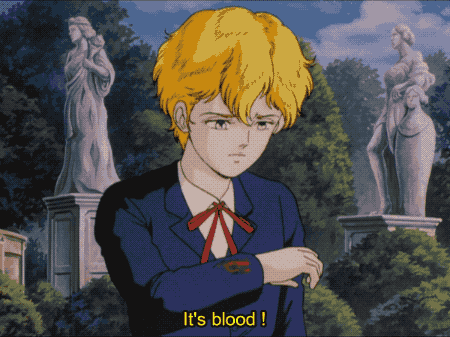
In this scene from the episode 4 flashback, Reinhard assigns to Annerose the kind of responsibility for his behavior that would ordinarily be reserved for a parent or guardian.

And then, after Reinhard and Kircheis have conspired to keep Reinhard’s misdeeds from his sister, Annerose puts their wet clothes in the laundry and dotes on them with hot chocolate and freshly baked pie. This is maybe the most archetypal depiction of motherhood I’ve ever seen, despite the fact that Annerose is both 1. actually Reinhard’s sister and 2. only five years his senior.
Reinhard’s father, who sold Annerose into sexual slavery at the age of fifteen, is obviously awful. And Reinhard’s mother, who hasn’t even ever been mentioned, clearly never had much of a presence in Reinhard’s life. Annerose is the only person (besides, eventually, Kircheis) we ever see taking responsibility and caring for Reinhard.
Reinhard’s family, as it is presented to us, is comprised of three people: himself, Annerose, and Kircheis. Though Kircheis is literally never (not once in all of LoGH!) referred to as being “like a brother” to Reinhard, their constant companionship since a young age means that their interactions often blur the line between surrogate-familial and romantic. The fact that Reinhard always brings Kircheis with him on visits to Annerose, for example, indicates that he at least views the three of them as a tight-knit unit.
But in Reinhard’s chosen family, there is a clear delineation of roles between Annerose and himself/Kircheis. In the gif above, Reinhard and Kircheis sit across the table from Annerose, who acts like a parent not just to Reinhard but to Kircheis as well; the difference in age and maturity between them is underlined by both Annerose’s matter-of-fact competence and Reinhard and Kircheis’s unashamed (and matching) nudity.
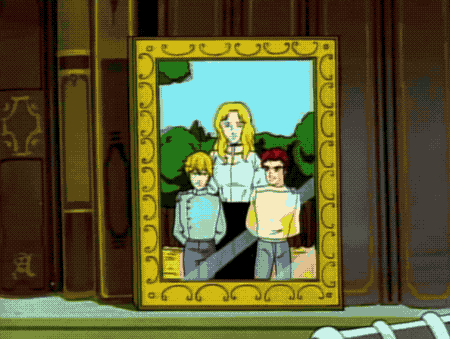
The photo that Kircheis gazes at in episode 25 (which eventually shows up in Reinhard’s locket, discussed later in this post) also draws a solid line between Annerose—who is more than a full head taller than the boys—and Reinhard/Kircheis. Kircheis’s sideways gaze at Reinhard serves to emphasize even further that they are a discrete pair.
Reinhard’s behavior towards Annerose starts to make more sense once you realize that he basically considers her his mother. Just as children tend not to understand—sometimes well into adulthood—that their parents are fully formed, flawed human beings with rich inner lives, so Reinhard has kept Annerose on a pedestal, treating her more like a symbol than a complex person. This also explains how Reinhard can, for example, be so blasé about teasing Kircheis in front of Annerose for his love of her cooking: Naïve as he is, the idea that Annerose might have feelings for Kircheis that go beyond platonic and motherly would never occur to Reinhard in a million years—unless something were to happen that brought Annerose’s feelings into stark relief.
Annerose Makes Up Her Mind
Which brings us back to the scene at hand, Kircheis’s death being the exact sort of cataclysmic event that might throw a wrench into Reinhard’s precarious relationship with his sister. And the second Annerose opens her mouth to speak, Reinhard knows something is wrong:
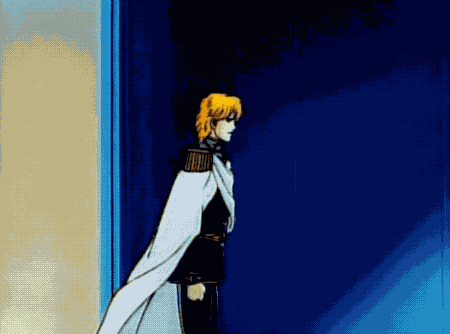
Annerose’s tone of voice here is as cold and distant as what she’s actually saying; rather than sharing in or sympathizing with Reinhard’s grief, she isolates him in it, trivializing his feelings of loss while also—by implying Kircheis was the only person Reinhard could ever care about losing—calling into question the authenticity of his devotion to her.
If Reinhard had been aware of all the little signs of Annerose’s resentment towards him that have been building up over the course of the last 25 episodes, this conversation might have gone differently—not because Annerose would have done a better job playing the part of the soothing sister/mother, but because Reinhard might not have been expecting her to. But Reinhard is naïve, especially about Annerose, so her abrupt switch from passive aggression (which Reinhard of course never picked up on) to overt hostility shocks Reinhard into a realization.
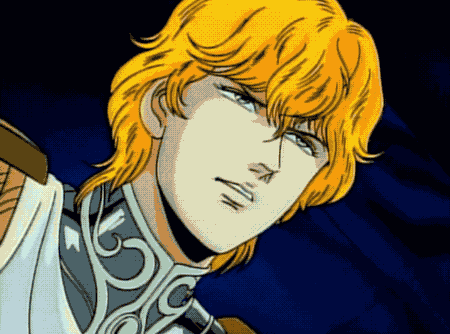
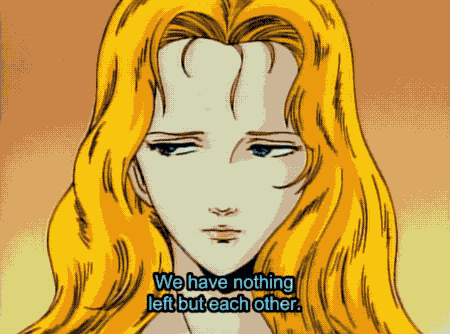
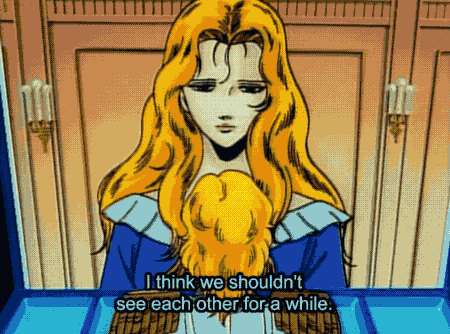

Above, Reinhard first protests Annerose’s disingenuous declaration that he has nothing left to lose, and then looks on in horror as it becomes clear that she intends to make it a true statement. But even while Reinhard listens, and responds, the gears are (visibly!) turning in his head, trying desperately to figure out what the fuck is going on. So let’s join him: What the fuck is going on?
First and foremost, I think, is Annerose’s desire for freedom. With Kircheis gone, she must realize that Reinhard’s need for her emotional support will increase astronomically. It’s one thing for her to live quietly in Reinhard’s mansion when he’s usually off gallivanting around space with his boyfriend; it’s quite another thing to share a home with someone who is grieving the loss of, as Mittermeyer so eloquently put it, half of his own self.
Because Reinhard may view Annerose as a mother, but that isn’t how Annerose views Annerose. We don’t actually know how she views herself—as I said back in episode 1, our entire characterization of Annerose is a reflection of how the world sees her—but we do know how she came to be Reinhard’s mother figure and, like her sale to Kaiser Friedrich IV, it wasn’t through any choice of her own.
In fact, this choice, the one to tell her grieving brother to fuck off so that she can finally get some time and space to herself, is the first choice we’ve ever seen Annerose make. So despite episode 26 ending on a catastrophic note for Reinhard’s relationship with Annerose, it ends on something of a triumphant note for Annerose herself: In choosing not to allow her well-meaning brother to use her as his personal grief counselor, she has finally, if perversely, reclaimed her agency.
Meanwhile, Reinhard has come to a completely different realization about Annerose’s motives:

My much earlier promise of a love triangle between Reinhard, Kircheis, and Annerose has finally come to fruition in true LoGH fashion, i.e. as morbidly as possible.
Make no mistake: The reason Reinhard asks this question of Annerose now is because it has never occurred to him before, and the reason it has occurred to him now is because Annerose is behaving in a way that he interprets as some mixture of jealous, vindictive, and heartbroken—none of which align with his image of his sister. Faced with her unambiguous and uncharacteristic cruelty, Reinhard searches around for an explanation and comes up with what would have sounded outlandish to him until this moment: romantic love.
But was Annerose in love with Kircheis? I don’t know. Frankly, I doubt Annerose knows (and we never get to see her answer, if she even gives one). Remember, Kircheis was ten years old to Annerose’s fifteen when she became the Kaiser’s concubine, meaning for most of the time they actually spent together, Annerose was basically Kircheis’s babysitter. It’s certainly possible that she developed romantic feelings for him over the years, or at least projected some romantic ideal onto him that she experienced as love. Given that he was probably the only male figure in her life besides her brother who was ever kind to her, it wouldn’t be surprising.
As a rival to Reinhard, though, my guess is that Annerose never considered herself in the running—and if anything, that would have made Kircheis an even safer object of affection for someone whose real-life experience with men was limited to a decade of blatant sexual exploitation. But that certainly doesn’t preclude jealousy or heartbreak; in that sense, Reinhard might be partially right about why Annerose chooses to act the way she does.
The accuracy of Reinhard’s suspicions, however, isn’t particularly important. What matters is that Reinhard has had this realization at all: In yet another twisted triumph for Annerose, and at immense cost, her brother has finally realized that she’s human.
Queerness
Given the reasons for the existence of this blog, it’s only fitting that we end our first season with a discussion of how LoGH treats queerness. Conveniently, this coincides with the creative team’s decision to convert a substantial portion of the show’s queer subtext into explicit text, done via multiple perspectives and narrative techniques throughout the season finale.
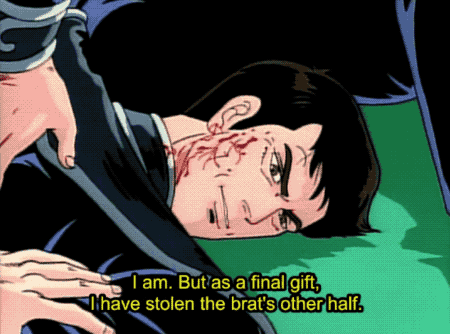
Our first open acknowledgement of the romantic nature of Reinhard and Kircheis’s relationship comes, unfortunately, from Kircheis’s murderer, Ansbach. The phrase “other half,” unlike much of the language used thus far to describe Reinhard and Kircheis, doesn’t have a heteronormative surface reading.
Incidentally, Ansbach’s easy familiarity with the concept of a romantic partnership between two men has always been one of the things that made me wonder about his feelings for Braunschweig—along with the fact that immediately after this, Ansbach tells Braunschweig to “wait for him in Valhalla” before killing himself.
Kircheis’s last words, too, work to remove a layer of heteronormativity from LoGH’s surface reading, albeit more subtly:

In this final, stunning example of a Reinhard-Bechdel Test failure, Kircheis uses his last breath to ask Reinhard to tell Annerose... that he kept his promise to be a good friend to Reinhard.
In a heteronormative piece of media, when a male character brings up a female character’s name in his dying breath, one would probably expect him to declare his undying love for her. That Kircheis starts his last sentence with “Please tell Lady Annerose...” and finishes it with a positive allusion to his relationship with Reinhard is an incredible subversion of heteroromantic tropes. It even goes so far as to “straight-bait,” dangling the possibility of Kircheis’s romantic feelings for Annerose in front of the viewer before categorically dismissing it.
Later, while Reinhard mourns, Mittermeyer uses similar language to Ansbach’s, above, to explain to Müller why Reinhard is in such an inconsolable state:

Like Ansbach’s usage of “other half,” Mittermeyer’s “half of his own self” doesn’t have a non-romantic interpretation to bolster LoGH’s increasingly shaky heteronormative surface reading. Also like (maybe) Ansbach, Mittermeyer is a character who (as we’ll see much more of soon) can speak from his personal experiences with queer romance, making him perfect for delivering this unambiguous message not just to other characters, but also to the viewer.
The last scene of the episode and the season finds Reinhard at Kircheis’s grave which, yet again, emphasizes his romantic relationship with Reinhard, and not just because of the inscription’s use of the singular possessive “my”:

Though the German “Mein Freund” directly translates to “my friend,” that isn’t actually how the phrase is used in Germany, where “Mein Freund” most frequently refers to a male romantic partner. The only ambiguity about Kircheis’s inscription is in how it’s translated: as わが友 in Japanese or, literally, “my friend,” obscuring the German usage and allowing it to continue to pass as heteronormative.
After placing flowers on Kircheis’s grave, Reinhard sits back, revealing that he has started wearing a locket. Opening it, he shows us that it contains a photo we’ve seen before of Reinhard with his chosen family, and a lock of Kircheis’s hair:

Season one of Legend of Galactic Heroes ends on a deeply personal note, and it also ends on a series of questions: What, or who, will Reinhard find to fill the gaping hole in his life left by Kircheis’s death? Will it be his rivalry with Yang? Other, darker questions are left unspoken, but their presence is felt nonetheless: Will Reinhard find something to “quench the thirst in his heart”? And, if not, what then?
Stray Tidbits
During this post, as usual, I’ve used gifs from the LD (original) versions of LoGH instead of their redrawn versions. Episode 26 was almost entirely redrawn, and many of the “remastered” scenes are dramatically different from their original versions, so I’m gonna give a few sample comparisons here. Kircheis’s death scene, for example, was changed to make his physical process of dying appear significantly less grisly. Below, on the left, the redrawn Kircheis’s body is still and his eyes are focused on Reinhard; on the right, the original Kircheis’s breaths are visibly laborious and painful, and his eyes are unfocused:


Below, Reinhard’s facial expressions and reactions during his conversation with Annerose were changed so drastically that he might as well be a different character. In the redraw (left), Reinhard is practically throwing a tantrum; in the original (right), Reinhard is still shocked, but keeps his composure as he struggles to process his sister’s unexpected cruelty, placing the emphasis squarely on his thoughts rather than on his feelings:

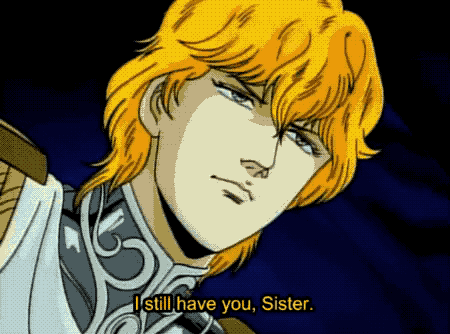
On a lighter note, the redraw team seems to have been confused (or, less charitably, offended) by this public display of intimacy between Reuental and Mittermeyer—in the redraw (left), Reuental stops Mittermeyer from standing by either touching his hand or just making a motion as if to touch his hand, keeping a respectful distance; in the original (right), Reuental physically impedes Mittermeyer from standing up by placing his hand on *draws a diagram* his very inner thigh, and leaving it there:


A small worldbuilding note: The dates on Kircheis’s grave are wrong! He was actually born in 467, not 468, according to every other marker of time in the LoGH universe.
And now for something extremely disturbing: An official LoGH-branded Kircheis roomba exists. When it’s low on batteries, it says, “I won’t be able to serve you anymore, Reinhard-sama.” Sadly, this is real and I’m not making it up.
#Legend of Galactic Heroes#Legend of the Galactic Heroes#author: Elizabeth#Empire#Reinhard#Kircheis#Annerose#Reinhard-Bechdel Test#queerness#family#holding hands#redraws#quote unquote friends#ow
57 notes
·
View notes
Text
Episode 20: Bloodshed in Space
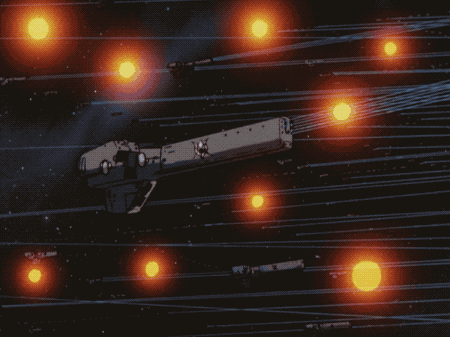
797/488. Reinhard sends Mittermeyer to kick the asses of some extremely whiny nobles, which he does with aplomb. Later, Reinhard sends Mittermeyer and Reuental together to... well, to attempt to kick the ass of Ovlesser, a significantly more threatening noble. Tensions mount among Braunschweig’s team, particularly between Merkatz and everyone else (save Schneider, of course). Reuental and Mittermeyer succeed at capturing Ovlesser, after much frustration and at great cost. Despite everyone else’s desire for revenge, the sinister Oberstein convinces Reinhard (and Reuental and Mittermeyer) to let Ovlesser go; as Oberstein predicts, Ovlesser’s comrades-in-nobility interpret his return as meaning that he betrayed them in some way, and he is unceremoniously executed as a traitor. Chalk up another win for Oberstein’s fucked up plans! Meanwhile, Mittermeyer makes moon-eyes at Reuental, and Ferner enjoys carrying out Oberstein’s plans a little too much imo.
Reuental and Mittermeyer

Reinhard and Kircheis are great and everything, but Reuental and Mittermeyer are the greatest love story of all time. I’m not biased.
(From “My Conquest.”)
I promised early on that eventually, Reuental and Mittermeyer’s relationship would stand alongside Reinhard and Kircheis’s as one of LoGH’s two epic love stories. Sadly, Reuental and Mittermeyer have had very little screentime up to this point, so I haven’t had much reason to talk about them for longer than to remind you that yes, they did go on a date this episode, thank you very much. Until now! Finally, in episode 20, Reuental and Mittermeyer take center stage, which makes now the perfect time to dig into their presence on the show so far.
Synchronization
When it comes to battle, Reuental and Mittermeyer are a well-oiled machine. We’ve seen them consult with each other before and after fleet battles; we’ve also seen them work together fluidly in hand-to-hand combat, without the need to consult at all:

In episode 11, Reuental and Mittermeyer invite themselves to help Kircheis rescue Annerose and, upon encountering a bunch of Benemunde’s cronies, take the lead in taking them down. Notice how Mittermeyer and Reuental claim their respective quarries by assigning them to each other, rather than to themselves, underscoring their affinity.
Above, Reuental and Mittermeyer communicate in a kind of shorthand: Rather than speaking directly about their plan, they talk around it, with the implicit assumptions not only that it’s already been decided save the details, but also that they both know what it is. And unlike the dynamic between Reinhard and Kircheis, who also have their own non-verbal methods of communication, neither Reuental nor Mittermeyer is subservient to the other: Both have an equal say and exercise their right to express that without hesitation.

Sorry Kircheis, this may be your fight, but it’s way more important for the audience to understand that Reuental and Mittermeyer are equals than it is for you to get to sit in the front seat. Maybe next time!
(From episode 11.)
We see this dynamic play out again in episode 20, when Reinhard sends Reuental and Mittermeyer to take down the bloodthirsty High Admiral Ovlesser. When the original plan to overwhelm him with battle-axe-armed infantry fails miserably (and violently, so, so violently), Reuental and Mittermeyer decide to go in themselves as bait—which all seems perfectly normal until you realize that they never actually discussed this plan out loud.

Just like the show’s audience, the aide standing literally right next to Reuental and Mittermeyer had no idea what their plan was until they both started talking about it simultaneously. In both a subtler and a more literal interpretation of Reinhard’s “Kircheis is the same as myself,” Reuental and Mittermeyer nonchalantly operate as if they share the same actual brain.
When they do eventually succeed at trapping Ovlesser, the battle-harmony between Reuental and Mittermeyer is even further emphasized, this time with some clever camerawork:

Mittermeyer kicks away Ovlesser’s axe, at which point the camera is behind his legs; then he turns around and... wait, it’s Reuental?! How did they do that?
Mittermeyer and Reuental have been acting as one all this time, but here the camera goes a step further and treats them like one physical body. Even when Reuental and Mittermeyer aren’t occupying space together on the screen, LoGH’s creators want to make sure we interpret them as two halves of a whole. This is a lot more than just a throwaway cinematic trick.
Body Language
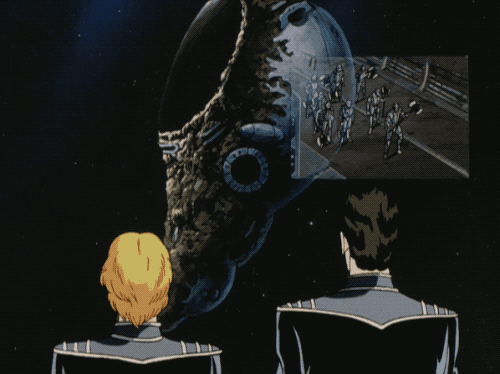
In the absence of expository flashbacks, the characterization of Reuental and Mittermeyer’s relationship is conveyed to us mainly via their (present-day) physicality. And the way they move when they’re onscreen together is unique to them, a visual representation of a type of intimacy we don’t see with the relationships between any other characters.
The gif above, in which Reuental and Mittermeyer sigh in unison, is a straightforward but striking example of how precisely their movements are choreographed to match one another. Mittermeyer leans his head slightly forward; Reuental leans his slightly back; the amount of negative space between them stays exactly the same the whole time, just shaped a little differently. Without mimicking each other’s positions, Reuental and Mittermeyer manage to give the impression of perfect balance. It’s a kind of approximate visual symmetry that’s both very expressive and very satisfying to watch—and we’ve been watching it, in fact, since “My Conquest.”

Like with their sighs above, here Reuental and Mittermeyer move in tandem—but instead of keeping the negative space between them the same, they move into it equally, so it becomes smaller but stays symmetrical. Also: Note the complementary head-tilts.
(From “My Conquest.”)

In many of these scenes, the camera itself remains static, allowing Reuental and Mittermeyer to be the only movement in the frame so the viewer can focus on how they fill a space together. In this moment from episode 5, the completely symmetrical background contrasts with how Reuental and Mittermeyer both reach subtly into the other’s “half” of the screen before settling against the balcony.
Not even the fact that Mittermeyer is several inches shorter than Reuental can get in the way of their visual balance—above, for example, Mittermeyer walks slightly ahead of Reuental, so his time in the center of the screen is longer. Below, Mittermeyer brims with energy and dynamism while Reuental is still as a statue until he expresses his restrained but emphatic agreement:

Mittermeyer’s physically asserted rage allows him to take up more space than his smaller stature would allow on its own, while Reuental, like Kircheis (usually), reins himself in. Taken together, they again balance each other out.
This isn’t the first time we’ve seen a couple’s dynamic encapsulated in how they move to fill the screen. In fact, the contrast with Reinhard and Kircheis’s framing helps reveal how carefully the animators worked to portray Reuental and Mittermeyer as equals:

The great thing about this moment from episode 4 is how strikingly out of balance Reinhard and Kircheis are while still using the same visual language of approximate symmetry that is used for Reuental and Mittermeyer. Kircheis literally struggles to catch up and be close to Reinhard, crawling back into the screen when Reinhard drags himself away—there’s symmetry here, but not equality.
When you combine all these elements—the give-and-take, the use of negative space, the slightly uneven but somehow perfectly balanced movement—you end up with scenes like the one below, in which Reuental and Mittermeyer discuss their aforementioned (and silently agreed upon) plan to ensnare Ovlesser. It’s a scene that is so casually well-choreographed that it is truly a wonder to behold:
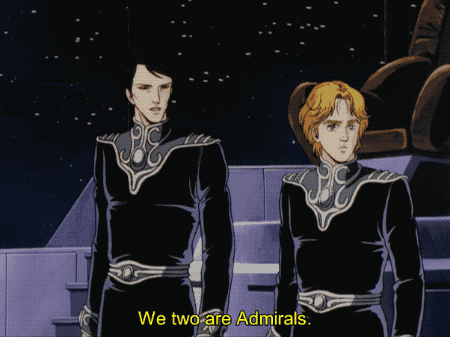
Looking at this gif fills me with a quasi-religious ecstasy. It’s perfect.
Above, Mittermeyer, who waits a beat before responding to Reuental’s movements, shifts his stance into the negative space that Reuental has just vacated, which keeps their bodies aligned. Mittermeyer puts his hands on his hips (a favorite position for him), and Reuental follows by putting his behind his back, so the space their bodies occupy is symmetrical but their postures are not. Mittermeyer waits for Reuental to put his openly gesturing hand away before putting both of his up; and through it all Mittermeyer is affectionately watching Reuental’s face while he describes their plan to someone offscreen.
At this point in LoGH, we still know next to nothing about who these two ridiculously handsome and distinguished admirals are. But if we pay attention to how their bodies interact on screen, we can begin to piece together who they are to each other. With Reuental and Mittermeyer, that’s a really good place to start.

Then again, sometimes you don’t have to pay attention beyond the embarrassingly fond expressions these two wear whenever they look at each other. Seriously this moment makes me blush. (From “My Conquest.”)
Ugh, More Character Redraws
I regret to inform you, dear readers, that the fiends behind LoGH’s cursed “remastered” character redraws are back at it again, and this time, it’s personal:

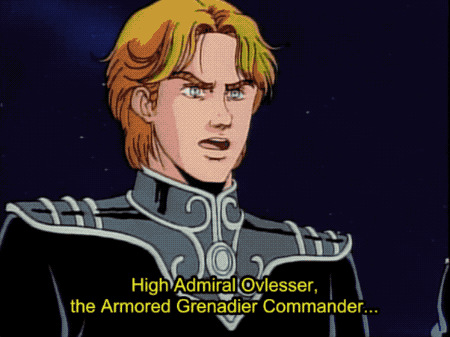
Of all the characters who suffer from redraws—and nobody is safe, NOBODY—Reuental truly has it the worst, because the changes made to his expressions venture into character assassination territory. Above, you can see a perfect example of how Reuental’s demeanor was completely altered (on left) from how he was originally animated in the LaserDisc version (right). On the LD, Reuental learns who is guarding the passage he is to infiltrate with Mittermeyer, and he is visibly concerned. In the remasters, his apprehensive frown is flipped into a smile that says: “I’m not the kind of person who would worry about all the troops under my command who are probably about to get killed!”
This is far from the last time we’ll see Reuental’s character hardened like this, and I promise I will point out EVERY SINGLE INSTANCE, because Reuental was originally drawn to be a lot warmer, gentler, and more human than the redraws would have you believe. It should go without saying that this is a pretty significant change, and one that has the potential to affect one’s interpretation of Reuental (and of Mittermeyer) a great deal—it should also go without saying that when there are big differences like the one above, I’ll be analyzing (and embedding gifs of) the original LD versions.
Stray Tidbits
I'm honestly so impressed with the visual shorthand for "awful" that the animation team uses to describe the Imperial nobles. It basically comes down to nothing more than their hair and facial expressions, but the overall impression is that they sure are a bunch of fancy little boys.

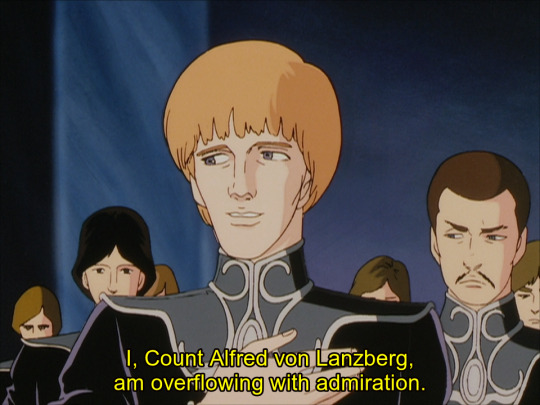
My first impulse is that Ferner needs to calm the fuck down for two seconds, but on the other hand, I guess I’m glad he has an acceptable outlet for his weird urges?

Besides war, drinking, and going on dates with Reuental (which usually involve drinking), Mittermeyer’s favorite hobby is roasting Bayerlein. Seriously every time Bayerlein tries to get in Mittermeyer’s good graces in some way, Mittermeyer shuts him down spectacularly. It’s incredible. I don’t know what Mittermeyer’s problem is but I’m not complaining, I mean look at that side-eye/eyeroll hybrid!

Mittermeyer is so good at war that he gave this guy an ulcer that almost killed him. Sure, I buy it.
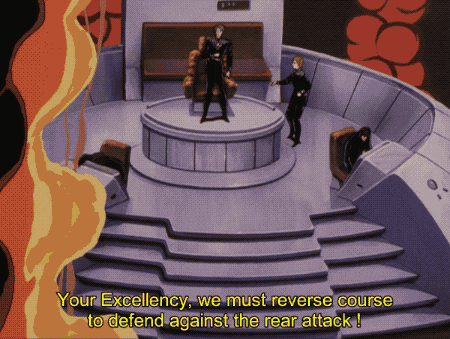
I’ve gotten a lot of mileage out of this gif, so now I offer it to you, humble reader. Go forth and use it well.
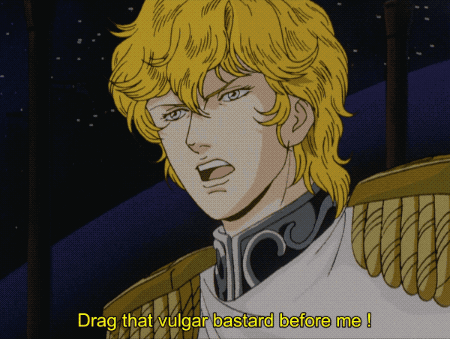
#Legend of Galactic Heroes#Legend of the Galactic Heroes#author: Elizabeth#Reuental#Mittermeyer#Empire#body language#redraws#Reuental deserves better#Oskar Meyer#that's the proper R/M pairing name#long-suffering Bayerlein
27 notes
·
View notes
Text
Episode 18: The Lippstadt Conspiracy

April 797/488. Now that Reinhard’s pick for Kaiser has taken the throne, the oppositional Braunschweig and Littenheim assemble a motley crew of disgruntled nobles to overthrow him and take down Reinhard in the process. Obviously, this goes poorly for them. Before that happens, Hilda takes the initiative to arrange an alliance with Reinhard, firmly positioning herself as the only remotely intelligent noble not already in his admiralty. Braunschweig appoints veteran admiral Merkatz to lead his anti-Reinhard charge; Ferner (unsuccessfully) takes matters into his own hands; and Reinhard, having gotten the jump on Braunschweig, struts around extremely pleased with himself. Annerose, meanwhile, gazes sadly at nothing in particular, and I think Reuental and Mittermeyer are too busy arresting treasonous nobles to go on a date. Oh well.
A few episodes ago, Rebecca introduced some of the less prominent—though still important—characters in the Alliance. Well, the time has come to do the same for the Empire! Episode 18 has some politically important plot stuff, and finally (finally!) properly introduces Hilda, but in terms of hidden meaning below the surface, there’s not much to speak of. So without further ado, I present to you a Who’s Who of some of the Empire’s many side characters (and Hilda)!
Hildegard von Mariendorf

I’ve mentioned Hilda a couple times before, but there wasn’t really any reason to until now, beyond the fact that she’s my favorite character and I love her. Now, we get to spend some much-anticipated quality time with the galaxy’s best and brightest lesbian. I’ll get more into the queerness of Hilda later on, when it’s discussed more directly; for now, let’s take our cue from the show and focus on what she does rather than who she is.

Hilda is the smartest person in every room, especially when that room is a bar full of Imperial aristocrats.
When we first meet Hilda in episode 18, she’s eavesdropping on a bunch of nobles gossiping in a bar about who they plan to support in the upcoming battle for supremacy between Reinhard and Braunschweig et al. Hilda, of course, has already made up her mind, which we see in a flashback to a very recent conversation she had with her father on the subject.

Unlike all the other dads in LoGH, Hilda’s dad, Franz von Mariendorf, is not a piece of shit. He takes his daughter seriously, respects her political opinions, and has no qualms about ceding his family power to her.

The uniquely positive nature of Hilda’s relationship with her dad, like other contrasts and comparisons in the LoGH universe, draws attention to the intentionality of the creative team’s choice to show us so many bad fathers. I’ll be talking about this a LOT more later, so keep it in the back of your mind.
Hilda has (correctly) realized that betting on Reinhard is so safe it can hardly be called a bet, and with her father’s blessing, she arranges to meet with Reinhard himself to discuss terms of a mutually beneficial alliance. Her frankness and obvious political acumen impress Reinhard, who takes an immediate liking to her, accepts her proposal (even agreeing to give it to her in writing, when she pushes him on it), and then leaves to go start the civil war that she predicted.

Did you somehow miss that Hilda is super driven and intense? Her expression here should clear up any remaining doubts.
The most striking aspect of this scene, though, isn’t the political maneuvering—it’s the introduction of the dynamic between Reinhard and Hilda, one of the most interesting relationships in the whole show. Almost right away, Reinhard is caught off guard not by Hilda’s boldness, but by how much he obviously likes her. His invitation for her to dine with him sometime in the future is the first time we’ve ever seen Reinhard take the social initiative with anyone other than Kircheis.
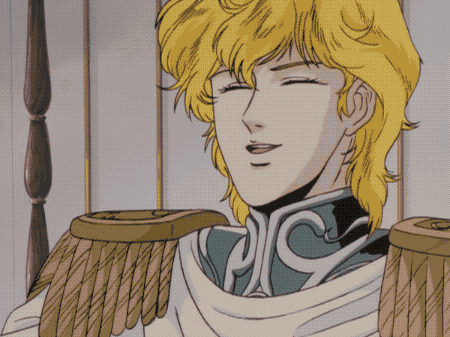
Fun fact, though: The first word that Reinhard ever says to Hilda is actually none other than, you guessed it, “Kircheis.”
As we’ve discussed at length before, relying on heteronormative shortcuts will get you nowhere in LoGH: The mood of this scene, despite containing within it a man and a woman, is as businesslike as Hilda’s uncompromising tone throughout; Reinhard’s interest is, of course, platonic. I love them.
Ernest Mecklinger
As I’ve said, Reinhard/Kircheis and Reuental/Mittermeyer are the two Great Romances of LoGH, so among Reinhard and his admiralty and for the purposes of a queer reading of this show, I’ve been focusing primarily on those four. But the rest of Reinhard’s admiralty is worth talking about too! I’m not going to go through all of them yet, because honestly very few of them make an impression at this point, but I’d like to spotlight a couple (no, not an actual couple, for once) of the more prominent less-prominent admirals who have been adding background color and texture for a while now.
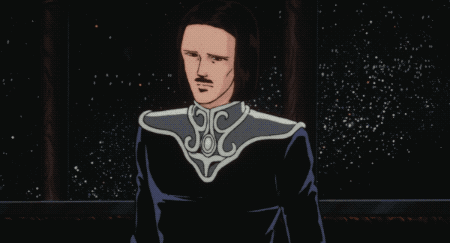
(From “My Conquest.”)
First up, Ernest Mecklinger! Canonically, I think he’s the only one of Reinhard’s admirals who has hobbies beyond “war” and “drinking.” They include: painting, general consumption of the arts, and presumably waxing his mustache. Mecklinger can usually be counted on to be level-headed and generous; he chooses his words carefully, and later on we’ll see scenes in which the only way to describe how he acts is Like A Sweetheart. In the novels, we are told that Mecklinger is nicknamed the “Artist-Admiral” because of how cultured and well-rounded he is.
Fritz Josef Bittenfeld
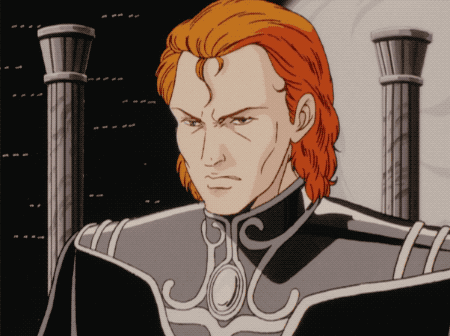
(From episode 16.)
On the complete opposite end of the spectrum is Bittenfeld, the short-tempered, bombastic commander of the Black Lancers (basically picture the intensity and camaraderie of the Rosen Ritter, except a fleet instead of an infantry unit, and without the long history of defection and betrayal). Bittenfeld has already been the recipient of one slap on the wrist—that would have been a lot more severe if not for Kircheis’s intervention—and frequently gets into trouble for rushing into dangerous situations before he’s fully thought them through, both on and off the battlefield.

Look, I did my best to sum up the differences between Bittenfeld and Mecklinger but I honestly don’t know why I bothered when this one exchange captures them so perfectly.
Anton Ferner

Here to answer the eternal question of “What if Oberstein, but hot?” is Anton Ferner, an Imperial cop who is loyal to whomever he dubs most able to make use of his loyalty. Like Oberstein, Ferner views himself less as someone with ambitions of his own and more as a tool to be wielded by someone more powerful. Also like Oberstein, Ferner has an unsettling air about him, made only slightly less so by the fact that he doesn’t habitually remove his eyeballs (that we know of).

You may remember Ferner from back in episode 9, when he sardonically refused to fire on the suicidally destructive Klopstock because a statue of Rudolph von Goldenbaum stood in his way.
However, whereas Oberstein has an overarching philanthropic goal that drives his utilitarian machinations, Ferner’s only motivation seems to be the joy he derives from serving someone he has deemed worthy. And here we get to the main difference between Ferner and Oberstein (other than their respective levels of hotness): Ferner can, in fact, feel joy! Or amusement, anyway.
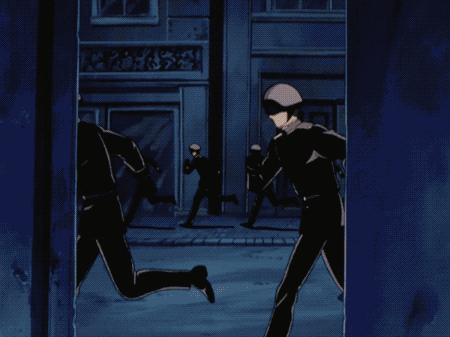
Ferner is constantly smirking when he’s been bested in some way; he absolutely gets off on other people being powerful and talented, but again, we’re not here to kinkshame.
After Ferner ignores Braunschweig’s orders, attempts to assassinate Reinhard on his own, and is summarily defeated, he surrenders to Reinhard and offers him his loyalty. Reinhard, never one to scoff at potential no matter how it ends up in front of him, accepts and, appropriately, gives him to Oberstein as a pet.

I’ll bet you thought I was kidding.
Oberstein and Ferner, the creepiest utilitarian weirdos in the galaxy, have found each other at last! I’m sure they’ll get along great; Ferner, at least, will probably think Oberstein’s removable-eyeball trick is hilarious.

And we must never ever forget that Ferner, according to Matsuri Okuda’s original character designs, started life as a rejected Reuental concept. Which may explain why I think he’s so beautiful.
Otto von Braunschweig (and Ansbach)
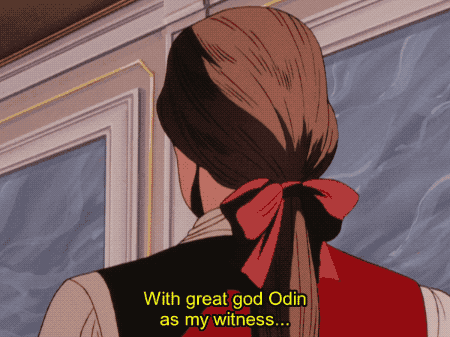
Have you noticed that nobody on Reinhard’s team—not even anyone of noble birth—has that awful George-Washington-style aristocrat hair? Even Mecklinger, who keeps his hair long, doesn’t wear it in a ponytail with an enormous bow. My point is that Braunschweig’s hairstyle, which is hideous, is also a good indicator that he is evil, or at least regressive. And whereas there’s an abundance of nuance when it comes to whether the Empire or the Alliance is morally “better,” everyone can agree on one thing: The Imperial nobles are bad. And Braunschweig, as their leader, is the most bad.

Another way to tell Braunschweig is evil is that he frequently does things like imply that if celebrated admirals don’t do his bidding, he’ll have their young daughters killed.
Braunschweig—who is the late Kaiser Friedrich IV’s son-in-law, by the way—is actually too unambiguously evil to be interesting on his own. The only thing that holds my attention about him beyond the fact that I want to cut off his ponytail is the fact that he is one half of yet another pair of men. And his loyal retainer and counterpart, Ansbach, is in turn only interesting insofar as parallels are set up between his relationship to Braunschweig and Kircheis’s relationship to Reinhard, particularly (so far at least) in episode 9:
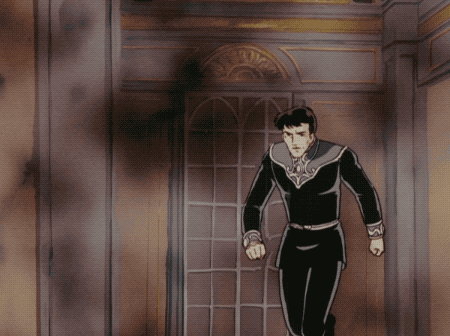
Remember this? The similarities between Ansbach and Kircheis’s frenzied searches for Braunschweig and Reinhard, respectively, are too striking to be anything but intentional.
Like I said in my episode 9 post, though, there’s no reason as of yet to think that the relationship between Braunschweig and Ansbach is romantic; even if that’s what the parallels point to, they’re one-sided at this stage, so if Ansbach’s feelings of devotion do cross over into romantic territory, it’s unlikely that they’re reciprocated. Sorry, Ansbach.

Incidentally, Ansbach doesn’t have a last name. Or he doesn’t have a first name. In any case, he only has one name, and it’s Ansbach. Also, if I didn’t hate him so much, I’d be worried about his skin. He looks like he could use several glasses of water, maybe applied directly to his face.
Willibald Joachim von Merkatz (and Schneider)

Merkatz was actually voted the class of 447’s Most Expressive Eyebrows at military academy. Wow!
Merkatz, a very accomplished and grizzled admiral who has been griping about Reinhard and his youth since episode 1, will spend more time in the spotlight later, but I wanted to mention him now for a couple reasons: First of all, his eyebrows are incredible and I can’t stop watching him move them. I honestly don’t know what he’s saying most of the time because I’m too focused on his eyebrows. I’m simultaneously impressed and scared. Second of all, we can go ahead and add Merkatz to the growing stack of (male) characters who are one half of a defined (male) pair.
Merkatz’s counterpart, Bernhard von Schneider, is a young officer who spends most of his screentime in episode 18 with his jaw on the floor while Merkatz explains to him the concept of nuance.
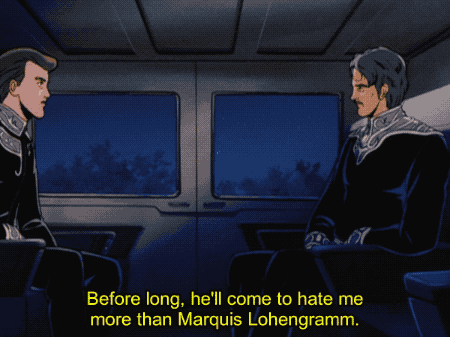
Or maybe he’s just mesmerized by Merkatz’s eyebrows. Same, Schneider. Same.
Anyway, keep an eye on these two, and by these two, I mean Merkatz’s eyebrows. I’d also recommend maybe paying attention to Merkatz himself, and Schneider too, because there will be a lot more to say about them down the line.
Stray Tidbits
I really enjoy how ostentatious literally everything to come into contact with the Imperial nobility is; like how are Reinhard and Kircheis's ships less flashy than something? How?


I am being personally victimized by the fact that this guy’s monocle doesn’t actually fall out.

#Legend of Galactic Heroes#Legend of the Galactic Heroes#author: Elizabeth#Empire#Hilda#Franz von Mariendorf#Mecklinger#Bittenfeld#Ferner#Oberstein#Braunschweig#Ansbach#Merkatz#Bernhard von Schneider#bad dads#good dad!#Merkatz's eyebrows
18 notes
·
View notes
Text
Episode 5: The Kastrop Rebellion

796/487. Maximilian Kastrop, a spoiled noble/apparent Caligula fanboy, rebels against the Empire. The members of Reinhard’s new admiralty (Wahlen, Lutz, Kempf, Bittenfeld, Mecklinger, Mittermeyer, Reuental, and—of course—Kircheis) are revealed to us. In order to help Kircheis get some military accomplishments under his belt, so to speak, Reinhard assigns the quelling of the rebellion to him. Bergengrun drunkenly hazes Kircheis, who succeeds at defeating Kastrop and getting promoted to Vice Admiral. Meanwhile, Reinhard and Kircheis make moon-eyes at each other, Annerose gazes sadly into a bouquet of flowers over a balcony, and Reuental and Mittermeyer go on a date.
Reinhard and Kircheis

Kircheis is his own person—who has chosen to make everything in his life revolve around Reinhard.
Episode 5 is all about Kircheis, but specifically in the context of his... working relationship with Reinhard. So far, though we (and Reinhard) know that Kircheis is a tactical genius in his own right, his reason for rising up in the ranks so swiftly has been that he’s tied to Reinhard. Now that Reinhard’s position is as close to the top as he can get for awhile, he shifts his attention to helping Kircheis gain some credibility more legitimate than “where Reinhard goes, I go.” The Kastrop Rebellion is the perfect opportunity for this: If Kircheis is able to stop it successfully, he’ll be promoted to Vice Admiral on his own merit and potential accusations of cronyism will lose traction.
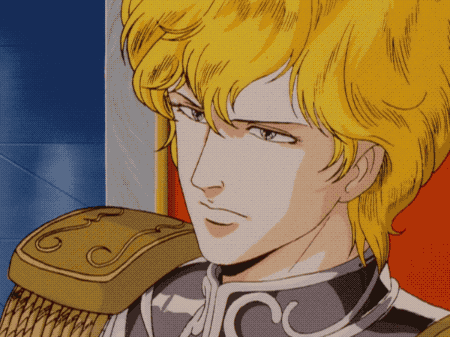
I love how intimate this exchange of nods becomes just because of how tight the shots are. And also because of the look in Kircheis’s eyes.
This decision is outlandish enough that literally everyone notices what Reinhard is actually up to—Reuental and Mittermeyer are first to alert us to Reinhard’s strategy, when they’re lightweight offended at not having been chosen themselves, followed by Lichtenlade and one of his goons discussing Kircheis’s unique “confidante” status. Then, when Kircheis succeeds at his mission, we get a very interesting moment with Rubinsky and his aide, over on Phezzan—the central, Empire-controlled merchant planet with a fair amount of galactic power and sway in its own right.
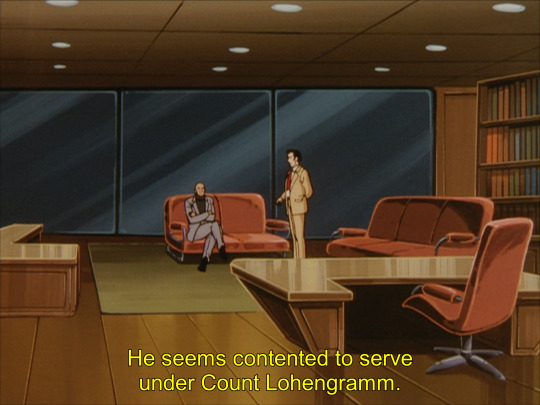



Awhile back, I said we would talk about usage of the word “friends” to describe the relationship between Reinhard and Kircheis, and you may have noticed when watching the above scene that the language around “best friends” seems a bit strange. In fact (thank you Rebecca!), a more accurate translation would go something like this:
Rubinsky: He seems content to serve under Count Lohengramm. [So far so good! -Eliz]
Aide: Well they are childhood best friends or something./Maybe they're childhood best friends or something. [It could be either one of these.]
Rubinsky: Best friends, huh? Whatever the case, we should find out more. If it's true it will prove useful.
Rubinsky and his aide here are not talking about the fact that Reinhard and Kircheis are friends; they’re speculating (unambiguously) about the ambiguity of Reinhard and Kircheis's relationship. What are they? Are they childhood best friends? Is it something different that we're not allowed to say on this anime that was made in the 80s? Hm. Let's look into it.
The different ways in which people around Reinhard and Kircheis refer to their relationship, and how Reinhard and Kircheis refer to it themselves are, like with everything else in LoGH, about more than just the words used—pay attention to related facial expressions and the general tenor of conversation as well or you’ll miss a lot. But the words, even ones as small as “toka” (the one that means “or something”) can also totally change the meaning of a scene. These aren't usually the sorts of changes that affect the sweeping political drama that LoGH is known for, but in a show that's so clearly committed to telling the stories of individual people against the backdrop of large scale politics, I'd argue these blink-or-you-might-miss-them nuances are actually more important to the work as a whole.
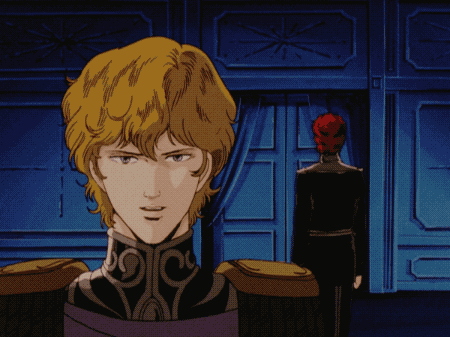
As is obvious from the cinematography, this is a very soft moment. The Japanese here (yasashii na) also makes it obvious—it feels a lot closer to “You’re sweet” than something as formal as “You’re a good man.”
...and Annerose
You’ll recall that we spent the majority of episode 4 in a lengthy flashback triggered by Reinhard and Kircheis’s visit to Annerose, but we didn’t get to see the actual visit. Well, now we do! Or at least, Kircheis remembers a specific scene from their visit, during which he has some interesting interactions with the two siblings.

Why is Reinhard teasing Kircheis about Annerose here? The best we can come up with is that Reinhard literally can’t fathom Annerose not being happy for them—after all, that’s how he would feel if Kircheis and Annerose were together.
This whole scene is uncomfortable as hell, and not all the reasons for that are clear yet at this point in the narrative, but eventually you’ll come back to it and be like “Oooooh, wow! I see what they were doing.” Before that time comes, however, I want to talk about what Annerose says to Kircheis here, and generally how she acts after Reinhard leaves.

Okay but it’s impossible not to mention this moment, at which Kircheis can’t stand to be alone with Annerose for even one fraction of a second. Just... I’ll come back to this. Much later. Put a pin in it.
Remember when I talked about how Reinhard, Kircheis, and Annerose all work together to pretend she has agency that she clearly lacks? The conversation between Annerose and Kircheis in this scene is the perfect example of her playing at exercising power that she doesn’t actually have.
Their conversation is frankly bizarre from beginning to end. It feels scripted; Annerose has been telling Kircheis to “take good care of” Reinhard literally since they met, and this is just another instance of that well-rehearsed exchange. That the relationship between Reinhard and Kircheis has changed and grown in the meantime—and independent of Annerose’s presence and influence—doesn’t matter to her at all, and when it seems like that fact might affect the course of conversation, she steamrolls right over it.
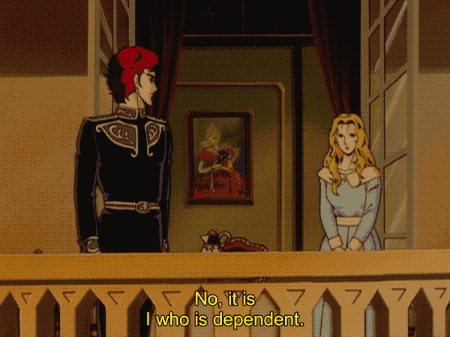
Annerose decisively shuts down Kircheis’s own assessment of his relationship with Reinhard because it doesn’t align with how she understands it, or how she wants it to be. Kircheis doesn’t protest.
Kircheis plays along verbally with Annerose’s sweeping and often incorrect declarations, but we can see clearly on his face that he’s aware of the layers of artifice at work here. His role, however, is not to contradict Annerose, but to respond to her in the very practiced, deferential way that he’s been deploying toward her ever since he was a child.

Kircheis’s little sideways glance here could have a couple meanings. One is “Does she know I’m dating her brother?” Another is more of a vague discomfort with and awareness of the level of playacting intrinsic to this conversation.
Annerose, meanwhile, “compliments” Kircheis in ways that double as veiled insults to Reinhard, and are clearly intended to put distance between Reinhard and Kircheis, while creating a sense of conspiratorial closeness between Kircheis and Annerose. Reinhard and Kircheis have quite literally left Annerose behind—she’s been stuck in the same tragic, stagnant situation for the last decade, while they’ve gone off to attempt galactic domination together. That they’re doing it ostensibly for her sake doesn’t change the fact that she is, again, powerless herself.
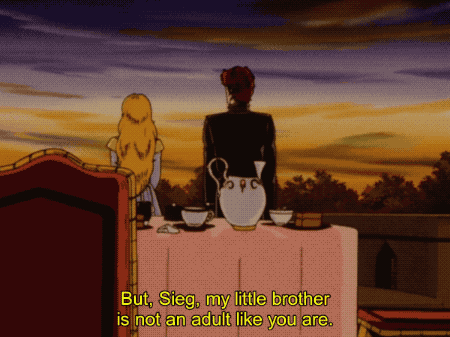
Annerose praises Kircheis’s maturity, but only at the expense of Reinhard’s. She is threatened by the idea of Reinhard and Kircheis being on equal footing with one another, because it shuts her out.
But Kircheis seems to know by now to take Annerose’s “compliments” and “wisdom” with about an ocean’s worth of salt. He’s empathic and probably has an instinctive understanding of why it’s important for Annerose to feel like she still has a role in his and Reinhard’s lives beyond being a damsel who needs saving; he probably also understands why it’s important to Reinhard that they continue to treat Annerose this way. After all, Annerose isn’t totally wrong about Reinhard: He is naïve, and one of his major points of immaturity is his idolization of Annerose. (Kircheis, of course, at the ripe old age of 20, is also naïve, and not somehow “more of an adult” than Reinhard.)

A better translation here for “talk to him” is “scold him”—Annerose is again trying to instill distance between Reinhard and Kircheis, and as you can see on his face, Kircheis isn't having it.
Whether her concerns are genuine or just a way to try and assert power is up for interpretation, but Annerose certainly acts like she has very little faith in Reinhard. Kircheis, on the other hand, has built his life around an ironclad, unwavering faith in Reinhard. And he’s not totally right either, of course: Reinhard is, like everyone in this show, deeply flawed and fallible. But here you can see that Kircheis disagrees with Annerose—he disagrees with her takes on Reinhard, and he disagrees with her takes on his relationship with Reinhard. Outwardly, though, he humors her, and at little expense to himself: What she asks him to do, to take good care of Reinhard, is what he’s already committed to doing.
Hilda
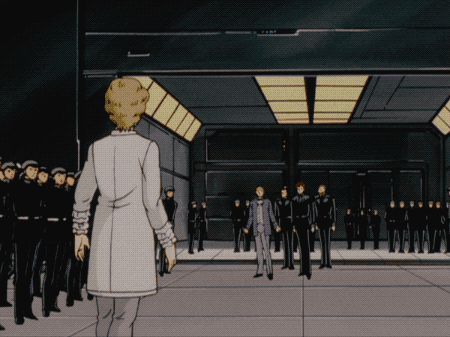
On a happier note, we finally get to meet LoGH’s very best space lesbian! Hildegard von Mariendorf aka Hilda, who appears in episode 5 for a hot second, is my top favorite character in this show that is chock full of favorite characters. I adore her, and I can’t wait for us to spend more time with her so I can talk your ears off about how extremely good she is. Stay tuned.
Stray Tidbits
These two background characters finally get names of their very own! Aw, how sweet.
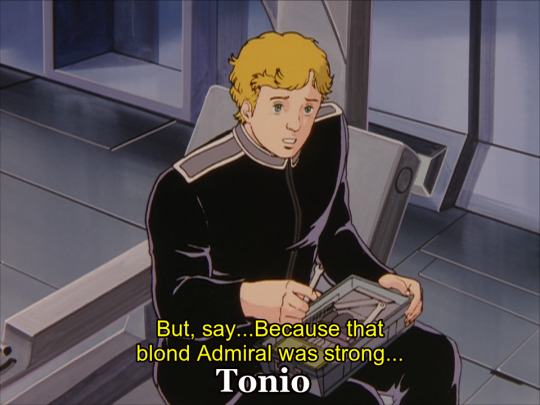

The LoGH anime team included these two seconds of footage to make sure you know for sure that yes, Reuental and Mittermeyer did go on a date to celebrate Kircheis’s victory.

Did you fall asleep and wake up watching a different show? No! Kastrop and his cronies really are this hilariously awful.

Well, maybe the women aren’t so bad.
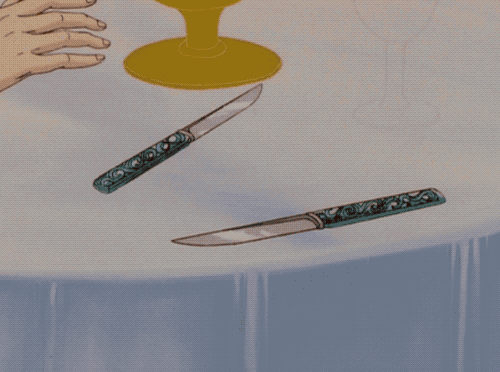
I didn’t talk about Bergengrun and Buro in this post because their role is mostly to show how Kircheis is viewed by his subordinates, and that may be important, but it’s not central to the themes I’m laser-focused on. However! They will be back, and they are interesting, so don’t write them off as Background Randos like I did the first time I watched.
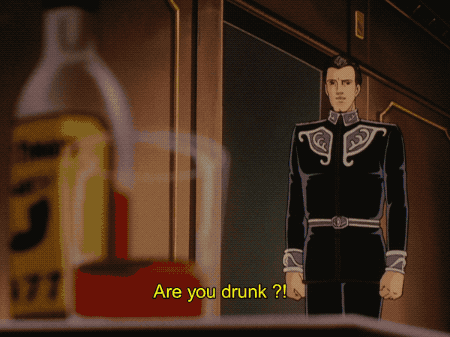
A translation/worldbuilding note: If you’re watching the official subs, the cool explosive particles that Kircheis uses to destroy Kastrop’s Artemis Necklace (a ring of defensive satellites) are called Seffle particles. In the books, they’re translated as Seffl. In the fansubs that have been around since the early 90s, they’re called Zephyr particles. Seffl/e is the most “correct” translation, because in-universe they were named after the guy who discovered them, Karl Seffl/e. Neat!
#Legend of Galactic Heroes#Legend of the Galactic Heroes#author: Elizabeth#Reinhard#Kircheis#Annerose#Hilda#language#quote unquote friends#queerness
28 notes
·
View notes